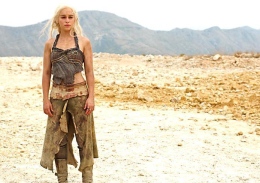The opening credits in “Game of Thrones” episodes previously showed where things were happening, but that trend has been broken in recent episodes. Oh, sure, the Wall has come to stand for all events north of it, and Winterfell represents Bran and Rickon’s storyline, but that doesn’t explain why the slaver city of Yunkai appeared in the sequence when Daenerys did not appear in the episode. For such an iconic title sequence, it could at least represent the events by only showing the cities that are in the episode.
Samwell Tarly makes an appearance early on, as do Bran and the Reeds, Theon, and Jaime and Brienne, but their scenes are mere continuances of the characters, to let the audience know that they’re still alive. (And in Theon’s case, still being tortured). Throughout the episode scenes are scattered with Jon and the wildlings, who climb the Wall into the Seven Kingdoms and reach the top at the end.
Melisandre (Carice van Houten) left Dragonstone three episodes ago on a mission to find king’s blood, which now leads her to the Brotherhood. She meets the six-time-resurrected Beric Dondarrion (Richard Dormer), and marvels – Thoros (Paul Kaye) should not have that much power, she says. He agrees, saying that he doesn’t have that power; he is merely a lousy drunk.
Thoros left Myr a believer in R’Hllor, but was an atheist when he reached King’s Landing. A priest in name only, he drank and whored his way through the Seven Kingdoms in King Robert’s service. When Dondarrion died when a lance was driven through his chest, Thoros said the ritual words, thinking they were only a respectful ritual.
And the Lord of Light brought Dondarrion back.
R’Hllor, the Lord of Light, appears to be the only god in this series that does anything. Prayers to the Seven new gods do nothing, just like prayers to the old gods of the north. Arya’s litany of people she wants killed isn’t really a prayer, but has changed her somehow. Melisandre looks into Arya’s eyes and sees brown eyes, blue eyes, green eyes, eyes that Arya (Maisie Williams) will “shut forever,” says Melisandre. “I will see you again,” she says, and leaves, having bought Gendry (Joe Dempsie) from the Brotherhood. The Brotherhood has its gold, Melisandre has Robert’s bastard, and Arya has nothing but the hope that she will be returned to her family by the Brotherhood.
Robb Stark bargains with the Freys to use their army to attack Casterly Rock, the home of the Lannisters. Robb broke a marriage pact he made with them, and because of that they ask a high price for the army: a formal apology, the castle Harrenhal, and Robb’s uncle Edmure Tully to wed a Frey girl sight-unseen. Edmure objects, but eventually gives in. His wedding will take place within the fortnight, and should happen in the next few episodes, unless the show’s creators neglect Robb’s storyline for an episode or two.
Perhaps the most significant and interesting scenes in the episode are the marriage negotiations going on in King’s Landing. Tywin Lannister (Charles Dance) meets with Olenna Tyrell (Diana Rigg) to arrange his daughter Cersei’s marriage to the young, homosexual Loras Tyrell. Olenna rejects the marriage – she does not want her family tainted with the incestuous relationship between Cersei and Jaime. Cersei is approaching the age when she will bear no more children, and Olenna wants heirs. Tywin threatens to appoint Loras to the chaste Kingsguard, ensuring that Loras will have no children. She reluctantly agrees to the marriage. The dialogue between these two plotters is magnificent, a testament to their acting skills and the scriptwriter’s work.
Elsewhere, Sansa (Sophie Turner) dates Loras (Finn Jones). She’s increasingly enamored of him, but he’s not attracted to her. Tyrion (Peter Dinklage) and Cersei (Lena Headey) watch from a balcony, knowing that Sansa’s dream marriage is not to be. Loras will marry Cersei, and Sansa will be stuck with Tyrion. Of all of them, remarks Tyrion, he is the worst off.
The episode finishes with political discourse between Varys (Conleth Hill) and Petyr Baelish (Aidan Gillen). Baelish wants to know whom Varys truly serves. Varys protests that he serves the realm, which Baelish says is a lie, “a story that we tell each other over and over until we forget that it is a lie.” Without the lie there is only a pit of chaos, says Varys. No, replies Baelish, chaos is not a pit.
“Chaos is a ladder. Many who try to climb it fail and never get to try again.” A cutscene shows prostitute and spy, Ros, filled with arrows, and Joffrey smiling. “The fall breaks them. And some are given a chance to climb, they cling to the realm or the gods or love – illusions.” Sansa is shown weeping as Baelish’s ship sails away from King’s Landing, taking her only hope of going to Winterfell. “Only the ladder is real. The climb is all there is.” The speech finishes with the wildlings reaching the top of the Wall.
Tying these threads together is beginning to simplify the tangled web of plots that George R. R. Martin wrote, but can the show continue to keep track of them all? They’d have to kill off some major characters to do it.
Rating: A- (Good script and acting, but still too many storylines.)



